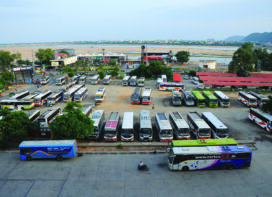Unfortunately, many drivers and riders, especially in developing countries, do not do any pre journey planning and driver training and discipline is limited. Add to that a rapidly growing vehicle population; with the result that countries like China and India account for the largest number of road accidents in the world – with India holding the dubious distinction of topping the list.
 There are a number of causes for road accidents including driver error, poor condition of vehicles, poor road conditions and lax laws / penalties. Statistics reveal that Heavy Vehicles contribute to about 25% of fatal accidents in India. Not surprising since more than 70% of goods traffic is through surface transport. The road transport contracting sector, which runs this business, is largely unorganised and the emphasis on safety is limited, emphasis on safety, if it exists at all, is limited. This results in loss of life and also negatively impacts productivity / profitability. Most corporates have no choice but to go along with the available transport facilities offering minimal safety standards. However, some corporate houses around the world insist on enhanced safety standards for their company owned transport vehicles. Castrol India, the leading lubricant manufacturer and marketer of high quality automotive, industrial and marine lubricants which is part of the UK based BP group, is among the top Indian companies that practices such safety norms. BP has been in the forefront setting safety standards following the awareness that company management has a big role to play in bringing down the over all national accidents. BP tracks SVAR (Severe Vehicle Accident Rate) and TVAR (Total Vehicle Accident Rate) which is the sum total of all ‘on road and off road’ motor vehicle accidents per one million kilometres driven.
There are a number of causes for road accidents including driver error, poor condition of vehicles, poor road conditions and lax laws / penalties. Statistics reveal that Heavy Vehicles contribute to about 25% of fatal accidents in India. Not surprising since more than 70% of goods traffic is through surface transport. The road transport contracting sector, which runs this business, is largely unorganised and the emphasis on safety is limited, emphasis on safety, if it exists at all, is limited. This results in loss of life and also negatively impacts productivity / profitability. Most corporates have no choice but to go along with the available transport facilities offering minimal safety standards. However, some corporate houses around the world insist on enhanced safety standards for their company owned transport vehicles. Castrol India, the leading lubricant manufacturer and marketer of high quality automotive, industrial and marine lubricants which is part of the UK based BP group, is among the top Indian companies that practices such safety norms. BP has been in the forefront setting safety standards following the awareness that company management has a big role to play in bringing down the over all national accidents. BP tracks SVAR (Severe Vehicle Accident Rate) and TVAR (Total Vehicle Accident Rate) which is the sum total of all ‘on road and off road’ motor vehicle accidents per one million kilometres driven.
Castrol has been playing a pioneering role in promoting road safety in the country – for its own employees, its partners and society at large. It has a simple safety philosophy – “Everyone who works for Castrol must go home safe every day”. From 2002, it has been on a collaborative and partnership journey with its third party transport contractors which has led to implementing the highest standards of road safety, resulting in significant reduction in road accidents by its contractors.
 According to Ravi Kirpalani, Automotive Director & COO, “At Castrol, we make no compromise on safety. Quite simply stated, our goal is “Zero accidents”. Over the years, we have undertaken significant initiatives to ensure that our transport operators maintain the highest standards of road safety – both in terms of hardware as well as software. Our Supply Chain safety team works very closely with transport operators to ensure collaboration and compliance and this has resulted in significant reduction in road accidents.”
According to Ravi Kirpalani, Automotive Director & COO, “At Castrol, we make no compromise on safety. Quite simply stated, our goal is “Zero accidents”. Over the years, we have undertaken significant initiatives to ensure that our transport operators maintain the highest standards of road safety – both in terms of hardware as well as software. Our Supply Chain safety team works very closely with transport operators to ensure collaboration and compliance and this has resulted in significant reduction in road accidents.”
The company’s safety programme focuses on every element of Driving Safety Standards, broadly categorised under: Vehicle, Driver, Journey and Process. Every day Castrol India has over 350 trucks transporting goods as bulk and finished products running across the country.
Vehicle condition
In India, goods movement is largely dependent on truck movement. But most of the trucks that carry the goods are not fit for purpose. Many of the vehicles are old with wooden cabins, no proper seats, makeshift doors and no seat belts. The result – extremely unsafe vehicles and difficult conditions for the driver. Besides, these trucks are not appropriately maintained as per the standards of Original Equipment Manufacturers (OEM) and more often than not are overloaded, resulting in potential danger not only for the concerned vehicles but also for the road users.
 TrafficInfraTech Magazine Linking People Places & Progress
TrafficInfraTech Magazine Linking People Places & Progress


